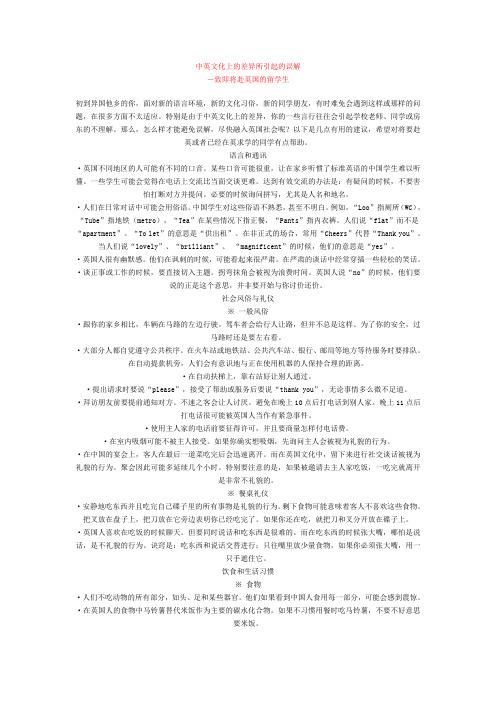文化差异!中国人与澳洲人最易发生的十大误解
- 格式:doc
- 大小:399.50 KB
- 文档页数:7

澳洲对中国买家六大误解房产价格高不怪中国人在澳洲房产市场海外投资激增,中国买家似乎占据着舞台中心。
目前,中国买家是澳洲住宅及商业地产的最大海外买家群体。
澳洲房产专家表示,一些地区房价高是因为长年价格的不断上涨,却把中国买家当成了房价高涨难以负担的替罪羊。
媒体也会重大强调中国买家,多过印度,法国或者加拿大等国买家,引发公众担忧。
房产专家公布了澳洲对中国买家的六大误解:1. 海外中国投资者推动房价高涨,使得澳洲首次置业人群买不起房实际上一般情况下,中国投资者和澳洲首次置业人群购房目标不同。
在墨尔本,中国投资者大多中意CBD的新公寓,或者华人聚居的郊区住房,例如Box Hill和Glen Waverley区。
多部分购买已建住宅的已经移民澳洲或者澳洲出生华人后裔。
确实,一些区域的澳洲首次置业人群需要与中国买家竞争。
但是年轻澳洲买家一般偏好于内城区Prahran,Brunswick,St Kilda和Richmond区的已建公寓,排屋和半独立屋。
海外买家在经过批准后,可以购买新公寓或排屋。
拥有特别临时签证的海外人员可以购买已建物业居住,但是离开澳洲时必须将其卖出。
2. 中国买家超有钱,拎着装着满满钞票的箱子来买房ACProperty地产主管Esther Yong表示,大部分中国买家购房目标平均价格在50万澳元至80万澳元之间。
她表示,很多人都以为中国人都拿着装满钞票的箱子走进来就买房,这其实很少发生。
因为新闻报道的都是中国人购买500万澳元,1000万澳元,2000万澳元的房子消息,但是没人会报道买了50万房产的新闻,所以给澳人留下中国人都很有钱的印象。
中国买家花钱时十分谨慎,不会过度支出。
3. 中国买家会高价买房,超过房屋价值一些澳洲卖家以为可以把房子高价出售给有钱的中国买家,大赚一笔。
但是情况不是这样。
中国买家觉得房屋有价值,或者拥有独特特征时,会多付钱。
但是澳洲买家也会这样。
Yong表示很多中国买家在澳洲都有家人或者朋友,会帮助进行市场调查。

澳洲留学生如何处理跨文化沟通问题对于前往澳洲留学的学子们来说,跨文化沟通是一个无法回避且至关重要的问题。
在一个全新的文化环境中学习和生活,能否有效地进行跨文化沟通,不仅会影响到学习的效果,还会对日常生活的质量产生重大影响。
首先,要理解和尊重文化差异。
澳洲是一个多元文化的国家,来自世界各地的人们带着各自独特的文化背景汇聚于此。
澳洲本土文化与我们的文化在许多方面存在明显的不同,比如在社交礼仪、价值观念、生活方式等方面。
在社交礼仪方面,澳洲人通常比较注重个人空间和隐私。
在与他人交流时,保持适当的身体距离是一种尊重。
在公共场合,大声喧哗被视为不礼貌的行为。
而在我们的文化中,朋友之间可能会更加亲近,交流时的声音也可能相对较大。
这就需要我们在与澳洲人交往时,调整自己的行为习惯,以适应他们的文化规范。
价值观念方面的差异也不容忽视。
澳洲社会强调个人的独立和自主,注重个人的成就和自我实现。
而在一些其他文化中,集体的利益和家庭的责任可能被放在更重要的位置。
当我们在与澳洲同学或朋友讨论问题时,要理解并尊重这种价值观念的差异,避免因为观点的不同而产生不必要的冲突。
生活方式上,澳洲人普遍热爱户外运动和休闲活动,比如冲浪、露营、烧烤等。
而我们可能在休闲时光里更倾向于选择其他的活动方式。
在这种情况下,我们可以尝试参与他们的活动,增进彼此的了解和交流,同时也可以分享我们自己的文化和生活方式。
其次,提升语言能力是处理跨文化沟通问题的关键。
虽然在留学前已经通过了语言考试,但实际生活中的语言运用要复杂得多。
要努力提高英语的听说读写能力,不仅能够准确地表达自己的想法,还要能够理解澳洲人的语言习惯和文化内涵。
在口语表达方面,要注意发音的准确性和流利度。
多与当地人交流,模仿他们的发音和语调,不断改进自己的口语水平。
同时,要学习一些常用的俚语和口语表达,这有助于更好地融入当地的社交圈子。
在听力方面,要多听当地的广播、电视节目和讲座,提高对不同口音和语速的适应能力。

中英文化上的差异所引起的误解-致即将赴英国的留学生初到异国他乡的你,面对新的语言环境,新的文化习俗,新的同学朋友,有时难免会遇到这样或那样的问题,在很多方面不太适应。
特别是由于中英文化上的差异,你的一些言行往往会引起学校老师、同学或房东的不理解。
那么,怎么样才能避免误解,尽快融入英国社会呢?以下是几点有用的建议,希望对将要赴英或者已经在英求学的同学有点帮助。
语言和通讯·英国不同地区的人可能有不同的口音。
某些口音可能很重,让在家乡听惯了标准英语的中国学生难以听懂。
一些学生可能会觉得在电话上交流比当面交谈更难。
达到有效交流的办法是:有疑问的时候,不要害怕打断对方并提问。
必要的时候询问拼写,尤其是人名和地名。
·人们在日常对话中可能会用俗语。
中国学生对这些俗语不熟悉,甚至不明白。
例如,“Loo”指厕所(WC),“Tube”指地铁(metro),“Tea”在某些情况下指正餐,“Pants”指内衣裤。
人们说“flat”而不是“apartment”。
“To let”的意思是“供出租”。
在非正式的场合,常用“Cheers”代替“Thank you”。
当人们说“lovely”、“brilliant”、“magnificent”的时候,他们的意思是“yes”。
·英国人很有幽默感。
他们在讽刺的时候,可能看起来很严肃。
在严肃的谈话中经常穿插一些轻松的笑话。
·谈正事或工作的时候,要直接切入主题。
拐弯抹角会被视为浪费时间。
英国人说“no”的时候,他们要说的正是这个意思,并非要开始与你讨价还价。
社会风俗与礼仪※ 一般风俗·跟你的家乡相比,车辆在马路的左边行驶。
驾车者会给行人让路,但并不总是这样。
为了你的安全,过马路时还是要左右看。
·大部分人都自觉遵守公共秩序。
在火车站或地铁站、公共汽车站、银行、邮局等地方等待服务时要排队。
在自动提款机旁,人们会有意识地与正在使用机器的人保持合理的距离。

澳大利亚和中国的旅游文化有何不同?作为全球最著名的旅游目的地之一,澳大利亚和中国的旅游文化存在许多不同之处。
下面将从多个方面探讨这些差异。
一、文化氛围澳大利亚是一个文化多元的国家,由于其历史原因,包括原住民文化、欧洲文化、亚洲文化、非洲文化等等。
这也让澳大利亚有着更加开放、自由、包容的文化氛围。
在澳大利亚,游客可以自由地探究当地的文化和习俗,这也是澳大利亚旅游文化的一大特色。
中国则拥有悠久而庞大的文化遗产,这些文化奇观无疑吸引了成千上万的游客。
中国拥有丰富的文化内涵和历史悠久的传统文化,国内游客喜欢探索文化遗产,比如古代建筑、历史博物馆等等,可以了解到丰富的历史文化。
二、旅游方式澳大利亚的旅游主要以自由行和自驾游为主。
在这里,当地住宿条件较好,而且旅游设施齐全,便于游客自由安排旅行行程。
另外,澳大利亚拥有美丽的自然风光和海滩,开展户外运动的条件也很好,非常吸引游客。
相比之下,中国的旅游方式则更多元化。
国内游客更喜欢参加旅游团,因此,旅游套餐、旅游线路受到很多游客的青睐。
此外,中国的文化遗产较多,游客一般都会选择参加文化体验项目、走进博物馆等项目,我们可以了解到中国传统文化。
三、饮食习惯澳大利亚和中国之间的饮食文化有许多显著的不同。
澳大利亚食品注重健康、新鲜和固定,主要以西式为主,例如牛排、鸡肉、鸭肉、羊肉、海鲜等等。
而中国食品则更多样化,具有浓郁的地域色彩,各地菜系各有特色。
大多数中国人饮食习惯较为节制,注重饮食的营养搭配和健康。
四、社交习惯澳大利亚和中国的社交习惯也存在一些不同点。
在澳大利亚,人们可能会更加热情和开放。
在聚会或酒会上,人们可以根据自己的心情和兴趣选择加入不同的组织,与不同的人交流。
此外,很多澳大利亚人热爱户外运动,喜欢与朋友一同进行各种户外活动。
相比之下,中国的社交习惯更为热络和亲密。
中国人最重视亲友之间的交往和联络,重视相互之间的关系。
正因为这种习惯,很多中国人乐意花费大量的时间与亲戚朋友聚会,进行一些传统的社交活动等等。

澳洲留学中的文化冲击和适应挑战留学是许多学子梦寐以求的机会,尤其是选择澳洲作为留学目的地。
然而,澳洲与许多其他文化背景迥异,这给留学生带来了文化冲击和适应挑战。
本文将从文化差异的影响、适应挑战以及解决方法等方面,探讨澳洲留学中的文化冲击和适应挑战。
一、文化差异的影响1.语言障碍语言是文化的一部分,留学生面临的最大挑战之一是澳洲英语的流利运用。
澳洲的口音、语速和俚语等都可能成为留学生理解和表达的障碍。
2.学术习惯差异澳洲的教育体系与中国有很大的不同,包括学习方式、课堂互动、论文写作风格等。
留学生需要时间来适应新的学术习惯和要求。
3.社交礼仪和文化观念澳洲社交礼仪和文化观念与中国也存在差异,如饮食习惯、个人空间、习俗等。
这些文化差异可能给留学生带来一定的不适应和困惑。
二、适应挑战1.语言学习留学生可以通过参加语言课程、多听多说、阅读和写作等来提高英语水平。
同时,积极融入当地社交圈子,与本地人交流,锻炼语言运用能力。
2.了解当地文化留学生应努力了解澳洲的文化背景,包括习俗、礼仪、价值观等。
可以参加文化交流活动,亲身体验当地的风土人情,逐渐融入澳洲社会。
3.寻求支持和帮助面对文化冲击和适应挑战,留学生可以寻求学校的支持和帮助。
澳洲大学通常设有国际学生办公室,提供学习、生活和心理上的指导,为留学生提供支持和解答疑惑。
三、解决方法1.交流与合作积极参与课堂互动,与教授和同学进行交流合作,将自己的观点和想法表达出来,增加理解和沟通的机会。
2.逐步融入当地社区参加学生组织、社团活动或志愿者工作,与当地人建立联系,增加社交网络,拓宽自己的圈子。
3.保持积极心态文化冲击和适应挑战是留学过程中常见的经历,留学生要保持积极的心态,勇于面对困难和挑战,相信自己能够逐渐适应并融入新的文化环境。
结语澳洲留学中的文化冲击和适应挑战是可以预料和克服的。
通过积极的努力和适应措施,留学生可以逐步适应澳洲的文化环境,取得学业和生活的成功。

中国女性嫁老外的几大难摒弃“褒贬评价”、“感性思维”和“抽象思维”,用一种理性客观的角度去分析。
“外嫁”不是想象的简单。
“外嫁”一词,最近在网上很流行,其实内嫁、外嫁都是一样的双方由恋爱到结婚,所不同的是:国籍、文化不同、附加值等不一样。
摒弃“褒贬评价”、“感性思维”和“抽象思维”,用一种理性客观的角度去分析。
“外嫁”不是想象的简单。
一、人口比例悬殊中国大龄未婚,离异等单身人数3亿左右,女士算一半的吧!美国总人口才3-4亿,看看男士的数量:减掉女士、减掉老人和孩子,30-55岁的成年人是多少?再减去非单身(即有家有女友)、再减去黑色人种、墨西哥和亚非拉没有身份或者不符合办理签证要求,还剩多少?这当中,有人喜欢中国文化,有人不喜欢,有人品质高,传统善良,那么综合看来:品质善良、对中国文化感兴趣、愿意对家庭负责的中产男、和所谓的高富帅有多少?据之前统计——2千多万,已经被各个网站渠道给稀释了,这还需要彼此对上眼,有感觉。
全世界不止中国女士看上传统老美,日本、韩国、印度、南亚等国家一样喜欢传统的美国白人,每一年中国留学生赴美留学,一个学校一千人,一个州多少学校,全美多少学校?女生一半吧,如果毕业后像继续留美,本科能找到好工作的概率很低,最好的办法就是嫁美国公民,竞争力可想而知。
可以做个假设,过来五万中国女士,就可以把全美的好男士给“灭”了。
当然有过“前科”记录的人,生活习惯不可苟同的很多,黑人、亚非拉的美国新移民,就算了。
说白了,池子里就这么点“有数的人”,想着“天下好男人等着女士去挑”,那是不现实的,有也是假话。
有人说澳洲条件好,嫁过去很舒服,只说对了一半,福利条件好那是针对澳洲公民,看看多少有身份的白人愿意娶?多数的华裔可能回头找吗?即使找了,自己未婚无孩是首要条件哦。
还有说欧洲,整个法国都不及美国德州的全州领土大,能有多少包容中国文化的好老外呢?二、诚信危机几乎全世界人们都知道,目前是移民潮,不但是中国人前仆后继移民美国,印度这种人口大国也是一样,多数人认为到了美国,拿个身份,等于改变了家庭命运。
跨文化沟通中存在的误解和解决方案在现代社会中,人们之间的联系已经变得越来越紧密。
世界的各个角落正在变得越来越相似。
人们的贸易和文化交流经常跨越国界和地域。
从另一方面来看,随着跨文化交往的增加,误解和摩擦也可能出现。
本文将探讨在跨文化沟通中存在的误解和解决方案。
误解一:礼貌的定义不同就像我们生活在不同的地区和国家中,我们的文化背景也不同。
在不同的文化中,人们对于礼貌的定义也不同。
在一些条件下,一些行为会被视为具有礼貌的行为,而在另一些条件下,同样的行为可能被认为是不高尚的或者不适当的行为。
在亚洲文化中,人们经常使用礼节性的语言,表达对对方的尊重。
而在欧洲文化中,举止和语言的严肃程度通常较低,较为随意。
解决方案:了解不同文化的礼仪了解不同文化的礼仪是理解跨文化沟通的重要组成部分。
我们可以通过阅读和学习来了解其他国家和地区的文化,比如张爱玲的小说,日本的动漫,天南地北的跨界交流等。
我们还可以在交往的过程中观察和记录别人的行为和说话方式。
这样,当我们与不同背景的人交往时,就可以更好地理解他们的礼仪,并更好地达成有效的沟通。
误解二:语言的障碍语言是跨文化沟通中最为明显的障碍之一。
语言不通常会导致沟通拖延,沟通中产生误解或者错误的理解。
解决方案:借助工具和资源为了解决语言障碍,我们可以利用机器翻译工具和在线翻译人员。
我们可以借助这些工具,以降低不同语言之间的沟通成本。
同时,我们还可以寻求专业翻译人员的帮助。
专业的翻译人员可以做到准确无误地传达信息。
当然,为了解决语言障碍,我们还需要寻找翻译人员和工具,以确保沟通的准确性和清晰性。
误解三:价值观和文化差异价值观和文化差异是跨文化沟通过程中的另一障碍。
不同的文化和价值观形成了不同的行为和信仰。
解决方案:秉持开放的态度为了更好地了解不同文化和价值观的差异,我们需要秉持开放的态度。
我们应该理解并尊重对方的文化和价值观。
我们可以尝试了解其他文化的理念和价值观,以便更好地与他们进行沟通。
跨文化交流中的误解与解决方法跨文化交流是在全球化时代变得日益重要的一项技能。
然而,由于不同文化之间存在的差异和障碍,误解时常出现在跨文化交流中,给交流双方带来困扰。
本文将探讨跨文化交流中常见的误解,并提供解决这些误解的方法。
一、语言误解语言是跨文化交流的基础,语言误解很容易导致沟通的失败。
语言误解主要包括语义误解、语法误解和口音误解等。
语义误解是因为不同语言之间的单词和短语的意义存在差异。
例如,在英语中,“cool”一词表示“很棒”或“很酷”,但在中国文化中,“cool”一词表示“凉爽”。
这种差异可能导致对话中的误解和混淆。
语法误解指的是句子结构和语序的不同。
在英语中,句子的主语通常在句子的开头,而在中文中,主语通常出现在句子的中间或结尾。
这种差异可能导致句子的理解不准确。
口音误解是因为不同国家和地区的口音差异。
同一个单词在不同的地方可能会有不同的发音,这可能导致听者无法正确理解说话者的意思。
为了解决语言误解,可以采取以下方法:1. 学习对方的语言和文化。
了解对方的语言和文化背景可以帮助我们更好地理解他们的意思和表达方式。
2. 使用简洁明了的语言。
尽量避免使用复杂的词语和长句,使用简单明了的语言可以减少误解的可能性。
3. 多加练习。
通过与母语为对方语言的人进行对话练习,提高对方语言的听力和口语能力,减少语言误解的发生。
二、非语言误解除了语言误解外,跨文化交流还常常伴随着非语言误解,即通过非语言行为传达的信息的误解。
非语言行为包括面部表情、身体语言、姿势和眼神等。
面部表情在不同文化中可能有不同的含义。
例如,微笑在西方文化中表示友好和喜悦,但在一些亚洲文化中,微笑也可能表示困惑或尴尬。
这种差异容易导致误解。
身体语言和姿势也可能因文化差异而引起误解。
例如,一个人在西方文化中可能以交叉双臂的姿势表示自己正在思考,但在某些文化中,这种姿势可能被视为不友好或冷漠。
眼神交流也是跨文化交流中容易出现误解的地方。
关于澳洲新移民及留学生常见十大问题1.语言障碍,英语不好语言是王道,借居中国领土之外,中文华语不再是唯一,双语甚至多语能够更好的生活在海外是多数人都承认的事实,不过照旧有许多的新移民和留同学在这点上面陷入极大的逆境,最显著的便是从高中阶段就前往的小留同学,英语的糟糕,使得低龄化的小留同学层的被淘汰率高得惊人。
2.思念国内的家人,伴侣每逢佳节倍思亲,慈母手中线游子身上衣,单独闯荡在澳洲,无依无靠者众多,凡事都需要依靠自己,因此思乡,思念国内的家人伴侣是许多海外华人无法迈过的一道心坎,这中间女留同学们所感受到的是更多的'伤心和思念;3.无法适应当地饮食虽然澳洲的饮食算是全球化国际化,世界各地的美食都可以在澳洲享受,但是无论如何从小以米面食物为主的华人,对于西方中东地区的餐饮并不非常欣喜,多数人对于国内家乡的美食照旧有这怀念,无法满意吃的感觉,也让华人们陷入食欲的困难;4.生活太无聊不够精彩澳洲人口稀有,加上华人的社交圈狭小,大多数的人的生活处以安逸状态,生活并不像国内的生活那样跌宕起伏,多姿多彩,消遣玩耍的地方少之甚少,喜爱扎堆,喜爱喧闹的中国人对于这样的环境并不非常热衷,甚至许多人有些圆满或者反感;5.文化差异巨大,无法融入澳洲本土的文化与东方文化的出入过大,华人特殊是留同学群体即使与西人同窗同学,共同度过高校三年到四年的光阴,但是基本上往往处于各过各的生活,主要是文化背景的不同,加上华人天生不爱好张扬,性格羞涩,导致只有为数不多的华人能够融入本土圈子,主体的华人无法得到主流社会的认可,认同感不高,也变相阻碍了文化互融的契机;6.租房太贵,居住辛苦澳洲的租房价格偏高的状况在世界范围内有目共睹,悉尼地区的房屋租赁价格甚至可以排到全球前五,租房租金许多时候都要占到新移民中的工薪阶层的40%的周收入,而对于留同学来说,过高的房租也渐渐积累着对于留同学背后家庭的经济负担,这类是始终压迫在新移民和留同学身上无法挥去的困难。
文化差异!中国人与澳洲人最易发生的十大误解 你和当地澳洲人闹过笑话或者误会吗?中西文化差异会造成两方人对某些事情的态度和做法的不同。加强沟通,理解万岁。为了让你和老外轻松相处,我们总结出经常发生的10种误会及其解决方法。
Top 10 赞美 西方人乐于赞美别人,同时也乐于接受别人的赞美。而中国人为了显示谦恭,常常会"拒绝"他人的赞美。这种"拒绝"会让老外觉得莫明其妙,好像你不领他的情似的。还有,中国人出于礼貌,或者想跟人套近乎,总是愿意说些关心人的话。为了献殷勤,我们常喜欢对客人说"You must be tired? Have a good rest.".然而,普通的问候之语却有可能让西方人误解为你对她的身体状况表示担忧。他们很喜欢别人夸他们年轻、强壮,如果你质疑他们的身体健康,他们甚至会发怒的。
Top 9 致谢 中国人认为对家里人或者好朋友的帮助是one's own obligation, no need to thank or be thanked,彼此根本不必说谢谢,说了反而显得关系生分。而老外 对家人或者朋友的帮忙都习惯说谢谢,他们期待polite expression like "please", "thank you",etc所以,和老外相处,千万不要吝啬"谢谢"两个字。"谢"少了只会让老外觉得你羞涩且不懂礼貌。
Top 8 出游 中国人结伴出游的时候,如果买什幺东西,花钱的那个人一般都会先统计有几个人,然后按照人头购买东西,即便有人之前客气地说不要,中国人还是会给他买上一份。When a Chinese offers refreshments or drinks to his colleague, hiscolleague often declines the offer politely, because he doesn't want to troublethe person who offers and it also shows his politeness. Normally the person whooffers still prepares or buys refreshments or drinks, and this will be expectedby his colleague. Sharing food and drink when going out together is commonamong colleagues and friends.然而和老外结伴出游,如果你客气地推说不需要某样东西,那幺对方真的就不会给你买。他们觉得不给你买是尊重你的决定。Respect one's own decision, "yes" means one wants it,"no" means one doesn't, politeness is usually shown by theexpression_r 'thank you' or "please".所以,想要什幺东西,就直接说出来吧,事后真诚地说声谢谢才是他们眼中的礼貌做法。
Top 7 称呼 当外国人听到中国人称呼他们为"老外"的时候,他们心里是不高兴的,因为他们觉得自己并不老,且很健康。他们dislike being labelled as "old", being young valued abovebeing old.而当他们听到中国人管外国小孩也叫"老外"的时候,他们才明白"老"其实是对某个人的尊称,比如老张,老王。"Lao" is a commonly used term by Chinese people to addresssomeone who is older than the speaker to show his politeness, respect andcloseness. The term does not necessarily mean old age. "Lao Wai" is acolloquial term of address for foreigners.
Top 6 送别 中国人表达情感的方式相对内敛。送别的时候,他们强忍泪水,吝于拥抱,种种"冷淡"表现让老外深感诧异。所以,如果你和老外送别,举止不妨洒脱奔放一些,可别让他们觉得你是"冷血动物". Like everyone else we are affectionate to our friends andrelatives, but perhaps we show our affection in public less than other peoples.Maybe the whole family as well as some friends will go to the railway stationor the airport to see a person off, no matter whether he/she goes abroad tostudy or to another province for work. This may well strike many Westerners asvery moving, yet they might be puzzled when they see that nobody will hug or kisswhen the time comes for saying goodbye. Friends may shake hands with the personwho is leaving and parents may hold his/her hand for a long time with tears intheir eyes, but with no other physical contact. In fact hugging and kissing areseldom seen in public in China, no matter what the occasion is.
Top 5 鼓掌 当众发言的时候,如果别人给自己鼓掌,为了表达谢意,中国人通常都会暂停发言,而后随着听众一起鼓掌。 In this way he expresses his thanks to the audience. 可是老外就不理解为何要自己给自己鼓掌。自己给自己鼓掌,多不谦虚啊。Of course, when a Chinese speaker claps his hands as the audience isapplauding, he is not applauding himself, but expressing his thanks to hisaudience. As noted earlier, Westerners feel puzzled when watching such a scene,since they think the speaker or the performer is applauding himself. 所以,以后老外在场,发言的人不妨用鞠躬或者挥手代替鼓掌。当然,微笑站立也是一种选择。
Top 4 眼神 许多中国人在和别人说话,或者当众发言的时候,羞于和听众进行眼神的交流。Some of them, perhaps because of nervousness, like to bury theirnose in their manuscript to read their speech all the time. 这种做法其实是不礼貌的。 与人交流的时候,老外expectseye contact, though this does not have to be constant. 而当众发言的时候,老外lookat his audience now and then. 他们是不会把脑袋埋在稿子里面说话的。 Speaking in public is also a kind of two-way communication, whichneeds eye contact from both sides. The speaker will certainly feel embarrassedwhen he sees that his audience do not look at him. But if he doesn't look athis audience now and then, his audience also has the right not to listen towhat he is saying. 如果你发言的时候没有勇气看听众,那幺你也无权要求你的听众会和你形成良好的互动。
Top 3 送礼 中国人送礼喜欢成双,比如说两瓶酒,两条烟。一是为了显示自己不是小气人,二是为了讨个吉利数字。去朋友或者亲戚家做客,拎点水果是非常普遍的情况。但是,在西方,人们送酒的时候都是只送一瓶。 One is quite enough, two are of course welcome but unusual and notexpected. 因为他们吃饭的时候要喝客人带来的酒,如果客人拿了两瓶,似乎表明客人是个酒鬼,主人恐怕一瓶酒不够喝。去朋友家做客一般也不送水果。水果一般是作为看望病人时候的礼物。而且,中国人接到别人的礼物,为了显示自己不是个贪财之人,习惯于把礼物悄悄放在一旁,然后等客人离开后再拆开包装;而老外则希望你当着他的面打开礼物,并对他的礼物赞美一番。 In the West , it is regarded as polite to open gifts as soon asthey are given to express appreciation. In China, the situation is quite thereverse. Normally we Chinese feel that if you open the gift as soon as it isgiven, you might embarrass the person who gives the gift and you might bethought greedy. So Chinese people tend to open the gifts after the visitorshave left. What is more, many people send gifts without wrapping them, and if theywrap them, they usually tell the receiver what is inside, and the receiver willthank the sender and put the gift aside without unwrapping them since theyalready know what is inside. However, when we receive gifts from an Englishnative speaker, in order to avoid